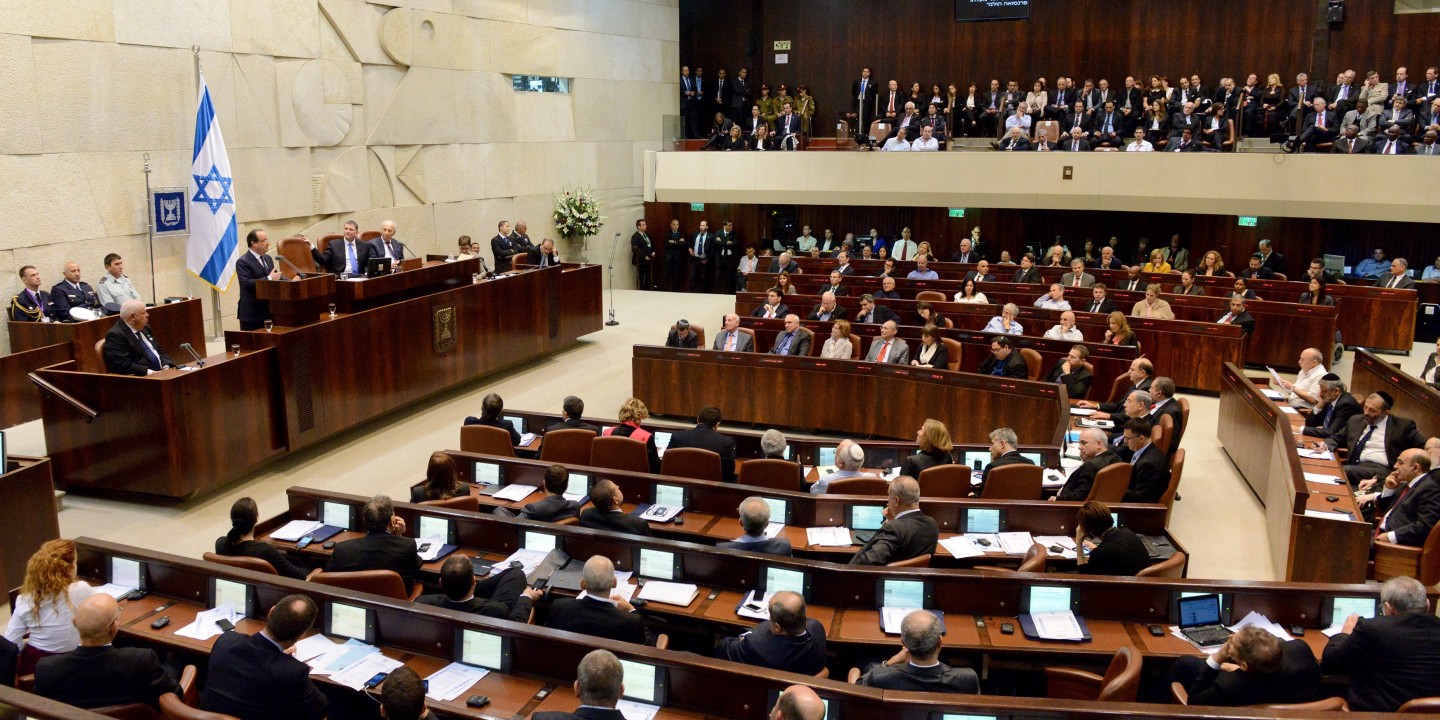What will Israeli politics look like after Netanyahu?
The promises and dangers of Israel’s new coalition government

Whatever else can be said about Israel’s current politics, it would appear that a change is in the making. How big a change, and how real it will be, is yet to be seen. But the very composition of the new government suggests that things cannot continue in the way they have been for the past few years.
The new coalition, a group that calls itself the “change party,” is emphasizing its intention to strike out in a new direction from that of the Likud party and its leader, Benjamin Netanyahu. Part of this is rooted in the willingness of the central parties that constitute the new government—Yair Lapid’s Yesh Atid, Benny Gantz’s Blue and White, and Naftali Bennett’s Yamina—to show their disgust with Likud and especially its leader.
Read our latest issue or browse back issues.
But there are also other parties in the coalition, ranging from right-wing parties (Avigdor Lieberman’s Yisrael Beiteinu and Gideon Sa’ar’s New Hope) to left-wing parties (Merav Michaeli’s Israeli Labor Party and Nitzan Horowitz’s Meretz) to the first-ever Arab party to be part of an Israeli government, Mansour Abbas’s United Arab List (Ra’am). This last member of the coalition may in fact prove to be the most radical change of the new government.
How will the new coalition work? First, it should be noted that Israel has generally had a number of parties ruling it in a coalition, so the fact that there are so many of them—as opposed to two or three, roughly expressing a simpler division between right and left—should be no surprise. What is unique about this situation is that never before have so many apparent rivals sat on the same side of the parliamentary benches.
Its diverse composition makes the new coalition vulnerable to instability, since a defection of any member could threaten the government’s existence. This is, of course, the fervent hope of the new opposition, who have tried, and continue to try, to entice members of former right-wing allies to move back to their “natural” party—the Likud.
The one thing that most of the constituent members of the new coalition share is their desire to see the end of Netanyahu’s 12-year leadership of the Likud party and of the country. Two observations could be made here: one about process, the other about existential realities.
The first is Netanyahu’s groveling to ex-comrades to leave their present positions to join him. This attempt has failed, although not for want of trying. Netanyahu’s propositions (for example, the revolving leadership he has promised to some) are weakened by the fact that he is being charged with three counts of bribery and corruption. Although he has denied any guilt, the fact that the legal investigation is ongoing during this period does not augur well for his own political future. He could end up with a lengthy prison sentence.
The existential dimension of this situation is underlined by the fact that the Likud party—whose name means “united”—is threatened by an internal revolt if and when they do become the opposition. There is no shortage of candidates to take over the leadership of the party should the new government carry out its threat to make Netanyahu’s return to power legally impossible. Netanyahu’s hold on the reins of power is as much a function of his personality as it is of any political ideology he may or may not hold. His narcissistic passion for power suggests that at some point he has become unstuck. Even to his longtime supporters, his words and promises have become patently unreliable.
This is not to say that some real issues have not already emerged in the ranks of the new coalition. Perhaps ironically, one of the early disputes centers around the issue of same-sex marriage. Meretz—the most left-wing partner of the coalition, whose leader is gay—is in favor of legislation making such ties legal. Opposition comes from Ra’am, the Arab party, whose ideology is openly Islamic and for whom same-sex marriage is anathema. There are other disputes related to the justice system and judicial appointments, construction in the settlements, and the relationship between religion and the state.
According to insiders, all of these disputes are real—but they can be ironed out as the price of retaining power. For some, indeed, this coalition of right, left, and Arab parties is nothing short of messianic. The wolf and the lamb will indeed feed together from the same trough.
Religious issues still play a considerable role in Israeli politics. The religious world in Israel is divided into two main blocks.
One is the religious Zionists, of whom the prime minister elect, Naftali Bennett, is a faithful member. This group is strongly nationalistic, and it includes those who are trying to evict Arab families from their East Jerusalem homes, an obvious problem for Ra’am. It also includes an extreme faction led by Itamar Ben-Gvir and Betzalel Smotrich (both students of the late Rabbi Meir Kahane), whose alliance with Netanyahu has made them implacable opponents of having any Arab party in their government, even though Netanyahu initially attempted to draft Ra’am into his coalition.
Bennett himself is a kippah-wearing, religious Jew—the first of such to hold the office of prime minister. But he never attended a yeshiva (a rabbinical seminary) and is therefore not beholden to any rabbinic sage for guidance on what he is or is not allowed to do. A self-made high-tech millionaire, Bennett is unlikely to heed a rabbinical censure. Like his coalition partner, Abbas of Ra’am, Bennett is a pragmatist who views politics as the art of the possible, not of magic and make-believe.
The other major religious block is that of the haredim. These are strictly observant Jews who are not necessarily Zionist. Indeed, the origin of the definition of haredi comes from the Agudat Yisrael party in the 1920s, which emerged in order to fight against the secular Zionists in Poland. The haredim have become strong allies of the secular Netanyahu and his party, mainly because of the funds that Netanyahu has directed to them and their various institutions over the years.
This alliance has angered many secular Israelis, since a good number of haredim have used these funds to avoid joining the workforce (and therefore to avoid paying taxes). The haredim have also avoided joining the army in significant numbers, thus weakening Netanyahu’s reputation as a security buff. Their standing among the general population has also been tainted by recent revelations of widespread corruption. Two recent disasters, which resulted in a number of deaths in their community, are directly the result of failures to follow government rules.
There is also a smaller, less vocal group of liberal religious Israelis. Many of these are followers of the late, provocative professor Yeshayahu Leibowitz, who once described the Israeli flag as a rag and the Israeli army as Judeo-Nazis. Many of this group remember the days of the National Religious Party, which was aligned with a labor party under Ben-Gurion and others and was known for its liberal, compromising attitude to the state and its institutions. Despite Leibowitz’s anger against the National Religious Party for being a part of the political process (he demanded a separation of religion and state), it flourished and established religious institutions parallel to those of the secular community. Today, the voices of such flexible, religious Israelis are almost negligible in the public debate, or at least their pronouncements are not covered widely in the media.
Lastly, the tone of the present debate must be noted. The language used has been extreme and often violent. The haredim are running scared, since they are losing control of the finance ministry to an anti-religious right-winger, Avigdor Lieberman. Their pronouncements are replete with words like traitor and hypocrite and phrases like “desecrators of the name of Heaven.” Similarly, their use of the term left to indicate a pariah is expressed as if it needs no explanation.
In the latest round of name-calling, Moshe Gafni of the haredi party demanded that Bennett take off his minuscule kippah, claiming he disgraces other owners of such a head covering—forgetting how his own party is immersed in all sorts of scandals and morally dubious activities. In an extraordinary move, additional guards have been assigned to leading members of this new government. There is a spoken fear that another political assassination is possible.
How all these conflicts and contradictions will resolve themselves is not known. In the public debate, there is no clear black and white but rather a murky, muddy situation that threatens to overwhelm Israel's fragile democracy.
It is time for this “wise and knowledgeable nation” (Deut. 4:6–7) to take its political welfare seriously.






